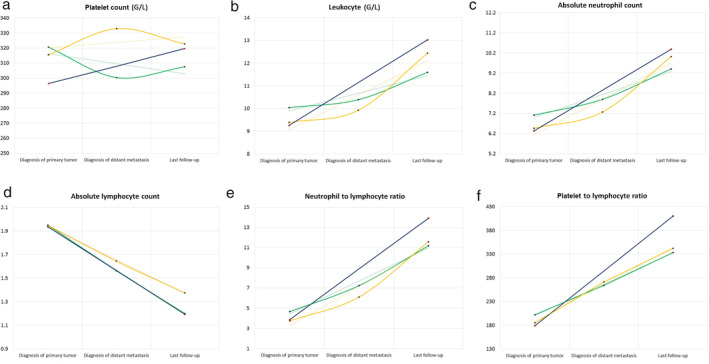Figure 1.

Longitudinal analysis of complete blood count (CBC) parameters and NLR and PLR ratios according to the date of diagnosis of the primary tumor, distant organ metastasis and last follow‐up. Plots illustrate how the occurrence of bone and brain metastases were related to the longitudinal courses of (a) platelet count ( ) Brain, (
) Brain, ( ) Bone, (
) Bone, ( ) Control; (b) leukocyte count (
) Control; (b) leukocyte count ( ) Brain, (
) Brain, ( ) Bone, (
) Bone, ( ) Control; (c) absolute neutrophil count (
) Control; (c) absolute neutrophil count ( ) Brain, (
) Brain, ( ) Bone, (
) Bone, ( ) Control; (d) absolute lymphocyte counts (
) Control; (d) absolute lymphocyte counts ( ) Brain, (
) Brain, ( ) Bone, (
) Bone, ( ) Control; (e) neutrophil to lymphocyte ratio (
) Control; (e) neutrophil to lymphocyte ratio ( ) Brain, (
) Brain, ( ) Bone, (
) Bone, ( ) Control; and (f) platelet to lymphocyte ratio (
) Control; and (f) platelet to lymphocyte ratio ( ) Brain, (
) Brain, ( ) Bone, (
) Bone, ( ) Control. The y‐axis corresponds to the value of the given CBC parameter, while the x‐axis shows the time frame according to the date of diagnosis of the primary tumor, distant organ metastasis and last follow‐up. The control group consisted of stage M0 patients and patients with other metastases. The dotted lines represent the linear trendline for each CBC parameter. P‐values for the distant organ metastases and assigned CBC parameters were obtained by the nonparametric Friedman test and Wilcoxon signed‐rank test.
) Control. The y‐axis corresponds to the value of the given CBC parameter, while the x‐axis shows the time frame according to the date of diagnosis of the primary tumor, distant organ metastasis and last follow‐up. The control group consisted of stage M0 patients and patients with other metastases. The dotted lines represent the linear trendline for each CBC parameter. P‐values for the distant organ metastases and assigned CBC parameters were obtained by the nonparametric Friedman test and Wilcoxon signed‐rank test.
